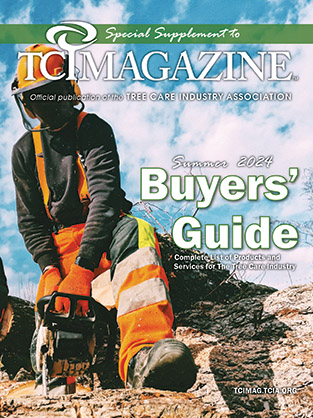Business Cards: The #1 Sales Tool in Arboriculture
Commercial tree care is a competitive business, whether you are a new operation or a long-
standing company. And whether we are in a market with a few full-time operators or with scores of companies (and don’t forget the ever-present pickup-truck and a chain-saw cutters, weekend warriors and uncles with chain saws), the most important aspects of our business life are the market competition, our efforts to exceed competitors and the battle to win contracts.
Those of us in the arbor care trade, no matter the zip code, tend to share common behaviors. One is a preoccupation with the tools of the trade. In no place is this more evident than at TCIA’s annual TCI EXPO – climbing gear, specialty clothing, PPE and, of course, the capital equipment that always draws crowds on the trade-show floor.
Yet there is an all-important instrument so often ignored by many in commercial tree care. This tool can have more effect on your business profits and growth than any mechanical apparatus, fancy corporate clothing or expensive truck wrap. This tool is evidence you are working on the business, not just in it, and so one should never be without it. This instrument is the selling arborist’s most important working gear. Without it, a business will survive, but with it, that business will thrive as you purposefully leverage every individual sales contact to generate more sales and higher margins. For decades, I have engaged this one simple tool that always makes a good first impression and begins a successful sale.
What is this tool? A customized business card.
I know, in today’s digital world, you might be thinking this idea is passe. But hear me out.
For more than a century, the axiom “The medium is the message” has been an unbroken rule within the marketing business. One only needs to observe the goods on a grocery shelf to see that packaging and image presentation is just as important as the product quality or price. Product perception is what induces the sale; a customer buys the pretty box, not just the breakfast cereal inside.
So too in tree care, we find that perception is essential to sales. Every time, every location, every quote submitted by an arborist needs “the pretty box.” If you don’t provide that, you enter the field unprepared. This understanding is critical for every tree care company representative.
Professionals, no matter the industry or geography, carry business cards and use them in the initial connection visit. Doing so is as significant as approaching someone’s front door with a genuine smile or giving a strong handshake to the property manager. It is a first impression and positioning tool; it is a standard in our modern corporate culture. Consistently handing a business card to my contacts has routinely provided many positive encounters.
Let’s look at a few examples.
1. An initial home visit is a common experience of all selling arborists. This is my opportunity to make a good first impression (and, as the saying goes, you don’t get a second chance for this). Greeting the tree owner with a smile and a business card delivers both an ID and the proper beginning to the sales visit. Providing that card is as important to your professionalism as a clean shirt and combed hair. If multiple tree care companies bid and you are the only one with a card, it will be a graphic impression and an elevating statement!
2. Sometimes when I call on a first-time prospect, the customer shows me my own business card. When I ask how they got it, they tell me that I worked for friends in the past and “My friends gave me your card.” In circumstances like this, you have been given an elevated connection that had nothing to do with your salesmanship skill or a marketing program. When a friend recommends your services, a potential client is more likely to consider you for the contract. Don’t let these opportunities fall by the wayside! Always leave another card when you complete a service call so your customers can make referrals.
3. When in a social setting and the subject of business comes up, inevitably people wish to talk trees. This may be OK in a general sense, but when they say, “I have this tree in my yard …” they have moved to their specific situation. It is important to remember that this is not a selling environment. Simply tell them, “Sorry, this isn’t a great time to talk particulars; here is my card” – and then pull one out of your billfold. “Our office opens in the morning. Give me a call and we can talk then!”
Many just want free advice and never call. In these cases, I didn’t waste my time. Those who do call, though, are a guaranteed sale. Networking opportunities can happen in unexpected situations, so having a stash of cards in your wallet and even in your glove compartment should become second nature.
4. Let’s say a call comes to the office requesting a site visit. While talking with the prospect, they mention, “You came out and looked at my trees several years ago, and I need you to come again.” I always ask them when I’ve worked for them before. “No,” they say, “I had someone else do the work (meaning they probably found someone cheaper), but I’d like you to come and tell me what to do now. I still had your business card.” This phone call is an almost sure contract for tree care, and many times it also can lead to a paid consulting opportunity. By leaving my business card, I have garnered an opportunity for a return call for further work, even if the initial contract went to someone else.
5. The business-to-business sales call is routine for most commercial arborists, and here the exchange of business cards is actually expected. Facility managers oversee vendors routinely, and there is almost always a card file, Rolodex or electronic card file. Yours must be included there. Again, if you’re the only arborist who issues a business card, you will be the first to receive a return call. Give them your card so they will remember you. And if they hand you their business card and you don’t have one to exchange, well, that’s never good. So don’t forget to restock before walking into another office.
6. Working together with allied green professionals is often a substantial part of an arbor care business. Some of these companies are under such pressure due to staffing issues that they’d prefer to give referrals rather than manage vendors. For these operators, I recommend giving them a handful of business cards. It will allow them to refer you to their customers with little effort on their part and it could mean big returns for you with almost no sales work.
In this world of email, websites, texting and social media, the professional business card is still a tested working tool. It is one that will better position your company and produce positive results. Have them made (consult a designer if it’s not your forte), keep them with you and hand them out freely. It’s a small expense that will reap great results through better connections, improved client impact and increased referrals.
Jeffrey Ling is a Registered Consulting Arborist operating as Arborwise, Ltd., and is the retired co-owner of TreeMasters, Inc., a former 11-year TCIA member tree care company based in Fort Wayne, Indiana. He has 38 years of commercial arboriculture experience and more than 50 years in business management.




